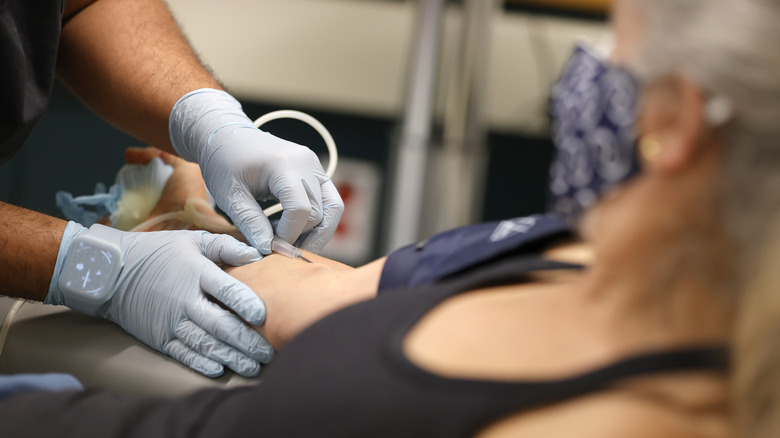Myths About Donating Blood You Need To Stop Believing
Blood donations have been at the heart of life-saving procedures for centuries, according to the American Red Cross. Of course, blood donation as we know it today hasn't been around quite that long. A national blood collection program wasn't established in America until 1940 when need and technology merged to create a demand for blood donations.
Since then blood donation has been a regular part of many Americans' lives, with donation drives set up in church and school parking lots to help ensure hospitals won't face shortages. But as UC Davis Health reports, those attempts have been falling short.
UC Davis Health has not offered a reason why many people haven't been donating blood, but for some, uncertainty around the procedure and long-standing myths about blood donation may be to blame. Rest assured many of the tall tales around blood donation can be put to rest and, hopefully, get donors back to the blood banks.
The myths
One common myth is that people with tattoos cannot give blood. Or, if they can, that they have to wait months after each new tattoo before they donate. UC Health puts those concerns to rest. Old rules might have barred inked donors, but new rules state that someone can get a tattoo and then immediately donate blood, so long as the tattoo was applied at a state-licensed shop. This may vary a little by state, however, so be sure to check local regulations and keep a copy on hand in case anyone hasn't heard the good news when you go to donate.
Similarly, you can still give blood after receiving a COVID vaccine or booster as well. In most cases, the vaccine and the donation can happen on the same day, according to the Red Cross. The only exception is in the case of people who get a live attenuated vaccine or who are unsure of what vaccine type they got. In those cases, donors must wait two weeks between their vaccination and donation.
The Red Cross also states that there is no age limit on donating, so long as the donor is at least 17 (or 16 with parental consent in some states) and meets weight requirements. This means that older teens and older adults alike can join in donation efforts.
Blood shortages endanger everyone, but like many emergencies, a blood shortage is a crisis we can avoid or end together.


